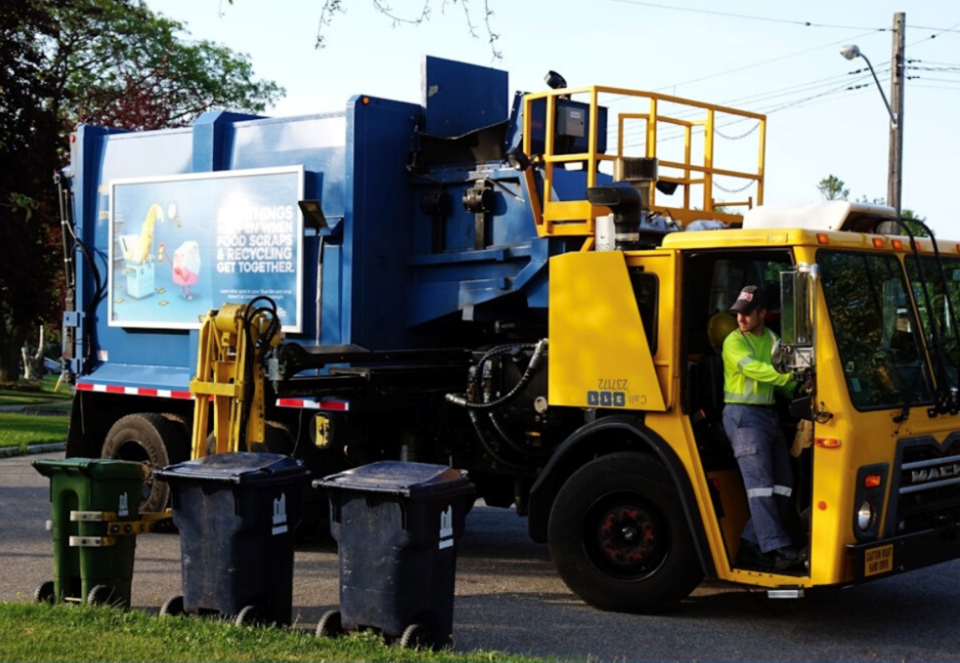New garbage and green bin carts could be dropped off at Cambridge doorsteps as early as fall 2025 now that the region has given preliminary approval to hire a waste management company to implement a new automated cart pickup system starting in March 2026.
The region wants to hire Halton Recycling Ltd., also known as Emterra Environmental, for collection, initial distribution and ongoing maintenance of the garbage and green bin organics carts.
The change in technology, with no change to frequency of pick-up, comes at an estimated eight-year cost of $284 million. Blue bin pick-up will remain the same.
The new service, first proposed last year, requires a fleet of automated collection trucks with mechanized arms to collect carts rolled to the curb.
The one-time cost to distribute carts is $25.7 million with that expected to happen in the fall of 2025 or early 2026.
Annual operating costs are in the range of $32.4 million.
"We feel this is the best path forward based on industry discussion," the director of waste management Jon Arsenault told the region's planning and public works committee earlier this week.
He urged councillors to approve the contract as soon as possible.
"We can't do this any cheaper," he said in response to a question about the possibility of the region getting its own fleet to do the job, like what had been done decades ago.
"The costs are the same for both of us, whether it's public or private. We don't feel we can do this internally," Arsenault said.
He said staff's biggest concern two-years out is if the region doesn't pass the recommendation soon there won't be enough lead time for the company to get the equipment and carts in place for March 2026.
The automated pick-up process follows the route several other municipalities across Canada have taken in recent years, including the City of Guelph and the City of Toronto.
The region's search for a new collection contractor began in February of last year in advance of the expiry of its contract with Miller Waste Systems in 2026.
The new service would include single-family homes, duplexes, three to six unit buildings, and multi-family units and townhouses that meet truck-access criteria.
Residents will get two vertical carts, one a 240-litre bin for garbage and a 120-litre bin for organics. The garbage cart holds the equivalent of three bags of garbage.
Items such as bulky or large metal items, yard waste and Christmas trees will continue to be collected manually.
A request for proposals on the automated cart system generated four bids and three were short listed.
Costs associated with the changes are about $17.2 million more than the existing contract, but reduced costs in operating blue bin pick up, now the responsibility of Circular Materials Ontario, will offset the increase by about $1.4 million.
The new service is also expected, over time, to save the region money in terms of staff service retention and litter control.
"I think the biggest driver for us is the industry is really going that way," Arsenault said.
Staff told council this week a trend of higher collection costs is reflected in contracts awarded by other Ontario municipalities. Increases have ranged from 30 per cent to 150 per cent higher.
The cost of the typical collection truck alone has gone up 50 per cent, Arsenault said. Labour costs are also up significantly.
The massive increase means amendments will be required to the region's 2025-2026 Waste Management capital program and operating budgets through 2027.
Staff believe funding for the carts can be accommodated through a temporary reallocation of funding from other regional reserves.
A "extensive" communication and education campaign will be part of the initial roll-out, starting with general awareness about the new program followed by stepped implementation and monitoring.
Staff plan to meet virtually and in person with local business improvement areas and will also arrange an appearance at Cambridge council to present the upcoming changes and discuss any impacts to curbside waste collection.



